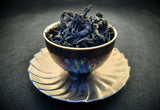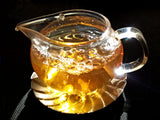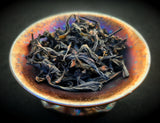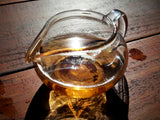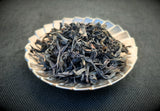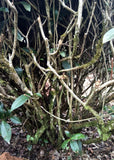This tea is named for its short stems, which extend only a short length from the ground before branching out. This leads to these bushes being relatively low to the ground. This gives them a lower center of gravity, which is advantageous, should they ever be attacked by taller bushes or trees. This tea has been grown for hundreds of years, and was previously used as a tribute tea for the Emperor. This particular Little-Foot Wulong was grown in the Wuyi Mountains, alongside the banks of the Nine Bends River.
Dry, the leaves of this wulong appear purplish-black, with hints of red and yellow, and carry a rich, sweet, green smell, reminiscent of a mossy, spring-fed stone pool that lies deep in a pine forest, with echoes from the bell of a distant temple that form ripples on its surface. Wet, its leaves smell savory and roasted, and its golden brew carries a very slight orchid aroma. Its flavor is savory, with a grain-like sweetness reminiscent of a bakery. Its woody flavor is full-bodied, but not heavy, and its texture is smooth. It has an aftertaste of bakery sweetness with a hint of orchids - a flavor quintessential of the wulongs of the Wuyi Mountains, where this particular Ai Jiao Wulong is grown. Its qi is warm and calming.
Its character is one of a friendly baker, who knows everyone in the neighborhood, and emerges from the kitchen with an apron covered in flower and a smile on their face to greet their customers.
Nomenclature: The Chinese name of this tea is 矮脚 - Ài Jiǎo
矮 - Ài - Short
脚 - Jiǎo - Foot. This character is often used less literally to refer to the legs or the base of an object.
Thus, the name of this tea could be translated as "Short-Foot," "Little-Foot," or "Short-Leg," or "Low-Base."
Lasts 6-8 brews.






